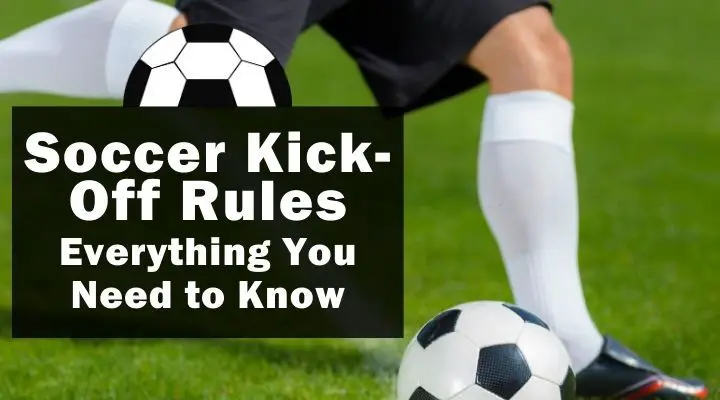Soccer Kick-Off Rules: Everything You Need to Know
As they’re used to start each half of the match as well as restart play after a goal has been scored, soccer kick-offs are an indispensable part of every game.
Besides these two common instances, kick-offs are also used to start each period of extra time should a cup competition or tournament not have a clear winner after 90 minutes.
As they’re such a crucial component of any soccer match, players, teams, and coaches must know the soccer kick-off rules and regulations as well as the procedure for taking them.
In addition to this, it’s also a good idea to be aware of any infringements or sanctions that may be committed when they’re being taken, both by the team kicking off and their opponents.
To help you better understand the soccer kick-off rules, here’s everything you need to know...

When and How Is a Soccer Kick-Off Awarded
There are three instances when a kick-off can take place:
- To start play at the beginning of each half of the match
- To restart play after a goal has been scored
- To start both halves of any period of extra time that needs to be played
Just before the match begins, the referee calls over the captains of both teams who contest the coin toss to decide which team kicks off first.
The captain that wins the toss can then either choose:
- To take the initial kick-off which then means the opposition selects which end to attack, or
- To select which end of the pitch to attack in the first half which then means the team that lost the toss takes the kick-off and begins the match
The team that doesn't start the match in the first half will instead kick-off the second half.
At half-time both teams change ends and so attack the opposite goal in the second part of the match.
The coin-toss procedure for determining which team kicks off again occurs if the match goes to extra time which could happen in a cup tie or tournament.
Besides these instances, a kick-off also takes place after every goal that’s scored.
The team that conceded the goal then kicks off after fishing the ball out of the net and restarts play.
Now that we've looked at when and how kick-offs are awarded and who takes them, let's turn to the rules and procedures for taking one.

Soccer Kick-Off Rules and Procedures
Once it has been determined which team is going to start the match, it’s time for the game to commence and the kick-off to take place.
Kick-off Rules:
- The ball must be stationary and start on the centre spot
- All the players except the kicker must be in their half of the pitch
- All of the opposition players must remain outside of the centre circle until the kick-off is taken
If all of this is in order, then the referee can blow their whistle to signal the start of the game.
Once they’ve blown it, the player taking the kick-off can kick the ball in any direction.
The ball is then considered to be in play once it has been kicked, has clearly moved, and no infringements were committed.
Although they may score against the opposing team directly from the kick-off, the player taking it may not touch the ball again until a player from either team has touched it.
All of these rules and procedures have to be followed for each kick-off whether it’s one that begins the match, restarts play after a goal has been conceded, or starts the second-half of extra time.
Now that we know the rules and procedures surrounding kick-offs, let's turn to some possible infringements that may see the kick-off retaken, a free kick awarded, and a player cautioned.

Soccer Kick-Off Infringements and Sanctions
Although it’s relatively uncommon, the kick-off might need to be retaken.
This could be due to a number of reasons like the ball was already moving when the player taking it kicked it or that the ball wasn't quite on the centre spot when the kick-off was taken.
It could also be because one of the kicker's teammates was standing in the opposition's half or that one of their opponents was less than ten yards away from the centre spot.
In any of these cases, the kick-off is retaken with the proper procedures and rules being adhered to.
If a player delays the restart too many times or for too long then they may receive a yellow card and a talking to from the referee.
Besides this, the only other time that an infringement may be committed is if the player taking the kick-off touches the ball a second time before anyone else has had a chance to touch it.
In this scenario, an indirect free kick is then awarded to the opposing team at the spot where the offence occurred.
This happens very rarely, however, and is inexcusable as all players should know how to take a kick-off without committing an infraction.
Conclusion
Well, there you have it.
Everything you need to know about soccer kick-offs from when and how they’re awarded, to the rules, procedures, and infringements surrounding them.
(Read our full blog post on all 17 soccer rules here)
As they’re a key part of any game, all players, teams, and coaches should know how to take them without committing an infraction and carelessly conceding possession to the opposition.
By following these simple rules and procedures, you'll be able to make the most of each kick-off in every single game.

